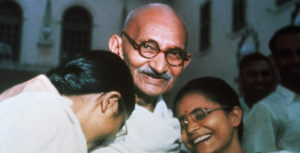When Abhishek Kumar goes to work in India’s eastern state of Bihar, he has to upload a time-stamped and geotagged image of himself to log in and out. If he doesn’t, he won’t get paid for that day. It’s all part of a new government mobile app — called the National Mobile Monitoring Service (NMMS) — which replaced a manual register in January in a bid to increase transparency and curtail corruption.
Yet the app has achieved neither of these things. All it’s done is create more anxiety for many of the 140 million workers registered under India’s rural employment scheme known as the “Mahatma Gandhi National Rural Employment Guarantee Act” (MGNREGA), who are all required by law to use it.
Kumar, 32, has been toiling under India’s rural employment scheme for four years now: working on public infrastructure projects such as road and building construction. He typically gets paid around 2,700 rupees ($33) per month for his labour — but last month, he earned only 1,600 rupees ($19), despite working the same number of days he always does. This is because, without good internet connectivity, the app is prone to glitching or not uploading photos, which means that Kumar doesn’t get paid for the actual number of days he works.
As the sole breadwinner of his family of five, Kumar is worried about providing for his children if this problem persists. “I don’t even understand what’s going on — sometimes I get less money and sometimes I get nothing,” Kumar told me. He’s not alone: as a direct result of this app, the number of workdays registered via MGNREGA have fallen 35% from 530 million in January and February 2022 to 340 million during the same months this year.
“There are weird technical error codes that nobody understands; numbers and alphabets that nobody really knows what they mean,” says Laavanya Tamang, a senior researcher with LibTech India, an organisation that works to improve public service delivery in the country. Tamang tells me about a group of seven MGNREGA workers in the state of Jharkhand who worked at their site every day: due to app-related issues, their attendance was calculated as zero. (The Ministry of Rural Development that runs MGNREGA did not respond to an emailed request for comment.)
As a result of this dysfunction, workers are agitated and trying to take action. Earlier this year, hundreds, from across multiple states, went to Delhi to protest the mandatory imposition of the technology, demanding that the app be rolled back. The protest lasted 40 days, followed by talks with the Government, but to no avail. “It’s like a human rights violation,” said Nikhil Dey, an activist who works with MGNREGA workers.
All this points to a bigger challenge for India. Over the past eight years, there has been a sweeping digitisation of many aspects of everyday life, from identity cards and Covid vaccinations to digital payments — all in the name of efficiency and inclusion. Narendra Modi’s administration has embraced digital governance, claiming it will make welfare services more transparent and weed out corruption. It was a key theme of India’s presidency at G20. “We in G20 have a unique opportunity to lay a foundation of an inclusive, prosperous and secure global digital future,” Modi told a group at the conference.
Yet by failing to consider the reality of rural life in India, Modi’s tech imposition has alienated ordinary people. In 2021, female rural childcare workers, known as Anganwadi workers, were mandated to use an app that led to them being overburdened with work for very little pay. It was met with protests across the country. Around the same time, female rural healthcare workers, known as Asha workers — who were on the frontline during Covid — were forced to install an app that would track their whereabouts. In many Indian states, sanitation workers have also been asked to wear a GPS wristband that would track their work hours, but many argue that such devices invade their privacy.
When it came to inoculating 1.4 billion Indians, the Government leaned on a vaccine slot-booking app called Cowin. By making it mandatory for people who wanted to get vaccinated to download Cowin, Modi left behind Indians from low-income backgrounds who didn’t have a smartphone or enough digital literacy to use the app. Concerns about data privacy also turned out to be credible. Earlier this year, the personal data of millions of Indians was exposed by a leak supposedly from Cowin — an especially problematic event in a country that did not have a data protection law until this August.
Of course, all these projects claim honourable motives. The NMMS app is intended to curb corruption in India’s rural employment scheme, which guarantees at least 100 days of employment in a year for rural households. Considered to be the world’s largest welfare programme in absolute numbers, the scheme has more than 250 million workers registered. But over the years, it has become notorious — for corruption. One investigation found that roughly $130 million of this programme’s funds were misappropriated in four years, used for bribes or as payments to non-existent people. “MGNREGA was infested with ghost accounts,” India’s finance minister Nirmala Sitharaman said last year, adding that Modi’s government was working towards using the programme with “transparency”.
Activists and policy analysts argue that the app has been ineffective in stopping corruption. “MGNREGA is riddled with corruption — when you go to villages you will see that many work sites only exist on paper, or the job cards are fake,” said Tamang. “But the Government’s approach to solving this is that they will slap on a tech band-aid and it will be resolved, which is not an informed approach that prioritises workers.”
The Government, however, isn’t paying attention. Despite strong resistance to the app, it brought in another tech innovation earlier this year. Now, all payments have to be done through Aadhaar, India’s vast biometric ID system — a process that further excludes thousands of workers. While most Indians have an Aadhaar number, many of them have had their information entered incorrectly: with spelling errors, or the wrong date of birth. This makes them invisible to the system.
The Government first announced this mandate in February, though it has since been extending the deadline to comply with it. But the damage is already done, says Mukesh Nirvasit, joint secretary of the Rajasthan Asangathit Mazdoor Union. “On the ground, many work sites have started rejecting workers unless they have an Aadhaar card, which is depriving people of work even though the deadline for this new rule has been pushed till the end of the year,” said Nirvasit. “In my opinion, this issue will not be resolved even if they give us 10 years.”
Yet either way, India’s internet connectivity will increase regardless, with one billion smartphone users expected by 2026. And while experts believe that some of the technical issues arising from the rise of digital governance will be resolved, the larger issue of surveillance and data collection will become commonplace. “Smartphone use is growing by millions per year and eventually, in five to 10 years, everyone is going to have a smartphone — but this will not only increase surveillance but also normalise it,” said Shweta Mohandas, a researcher with the Center for Internet and Society. “There’s also asymmetry in terms of consent because what happens if a worker doesn’t give consent to their data being captured? Would this mean that they would not be able to get the job?”
Disclaimer
Some of the posts we share are controversial and we do not necessarily agree with them in the whole extend. Sometimes we agree with the content or part of it but we do not agree with the narration or language. Nevertheless we find them somehow interesting, valuable and/or informative or we share them, because we strongly believe in freedom of speech, free press and journalism. We strongly encourage you to have a critical approach to all the content, do your own research and analysis to build your own opinion.
We would be glad to have your feedback.
Source: UnHerd Read the original article here: https://unherd.com/




